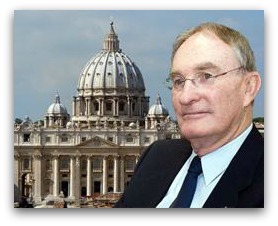Before making their joint visit to Rome the Australian Bishops promised that they would take up there the dismissal of Bishop Bill Morris and the process followed in it.
On their return they have issued a brief letter about the matter.
They report that they met the heads of the two chanceries involved, and also held discussions among themselves.
They do not seem to have spoken with Pope Benedict about the matter.
They explain that the Pope asked Morris to resign when the latter could not provide satisfaction that his views on catholic ministry were in accordance with Catholic teaching.
The Pope dismissed him when Morris refused to resign. In acting in this way Pope Benedict was exercising his responsibility to confirm the church in unity of faith.
The Bishops accepted the action of Pope Benedict and reaffirmed the basis of their own position in communion.
They finally asserted their commitment to heal the wounds of division, to extend fraternal care for Morris, and to strengthen the bonds of charity within the Australian Catholic church.
The letter is an act of closure.
But it bears reflection.
The number of meetings mentioned makes it clear the bishops took seriously their commitment to raise the issue. We can also imagine the frustrations, mixed feelings and eventual satisfaction or disappointment they may have experienced.
The Bishops will be criticised for looking at the business through the lens of their own relationship to the Pope.
But this was a matter of integrity.
They are Catholic bishops whose responsibility for the unity in life and faith is exercised with and through the Pope as successor to Peter.
In the Catholic understanding the Pope has the personal responsibility and right to defend the church's unity in faith and unity.
Once the bishops knew that in dismissing Morris, the Pope understood he was discharging this responsibility, they knew he was acting within his rights.
This is common Catholic ground.
But the issues raised by Morris' dismissal were not about the Pope's right to act, but about whether his decision was wise and prudent in the manner of its making. It was not about the authority to govern but about the exercise of governance.
The reason why many people questioned the decision was that the best standards of governance in Western democracies are characterised by transparency, natural justice, and due process.
It is common experience, not least in the treatment of asylum seekers, that when these are lacking, decisions are often made that do not respect the human dignity of those affected.
The sexual abuse crisis in the Catholic Church has raised sharp questions about its standards of governance. That is why Morris' dismissal aroused such concern about due process and transparency.
The Bishops' description of the actions of the Holy as 'fraternal and pastoral, rather than juridic in character' points the questions raised about governance even more sharply.
In Australia, at least, we have come to recognise how decisions reached in informal processes can harm and leave without recourse the people affected by them.
In the case of Morris this fraternal and pastoral process led to juridic consequences: the dismissal of a bishop and damage to his reputation.
Morris is necessarily the object of the Bishops' letter.
From his perspective the letter could only be seen as the endorsement by his former colleagues both of the process that led to his dismissal, and of the verdicts that his faith in respect of ministerial priesthood is not that of the Catholic Church, and that he was breaching communion.
It is hard to imagine that someone who has given himself so faithfully to the service of the Catholic Church will not feel in this judgment a sense of personal rejection.
That invites reflection on the Bishops' admirable commitment 'to do whatever we can to heal any wounds of division, to extend our fraternal care to Bishop Morris, and to strengthen the bonds of charity in the Church in Australia'.
These are commendable aims.
But the unaddressed issues of governance will make them more difficult to realise.
They drive a wedge between the human meaning of fraternal care and healing the wounds of division, and the more restricted meaning available in church circles.
In human terms the care we offer to a brother who believes he has been unjustly treated will be fraternal only if we are open to the possibility that the judicial process worked unjustly.
We can heal wounds of division only if we are open to the possibility that each side might have acted wrongly. We can build bonds of charity only when we go out to people with open hands.
But if we are constrained to insist that our brother accept not only the court's verdict but also the fairness of the process, our care will not ordinarily be described as fraternal.
If we address division by insisting that the other side must acknowledge our version of events, the result will not ordinarily be described as a healing of wounds.
The meaning of fraternal care and the healing of the wounds of a division will be a private meaning. Others might describe our attitudes as reinforcing boundaries.
If unity and bonds of charity are to be built, it is best done by winning, not losing, our brothers and sisters.
Even after reading the Bishops' letter it is easier to see what has been lost than who will be won.
Andrew Hamilton is consulting editor of Eureka Street.






No comments:
Post a Comment